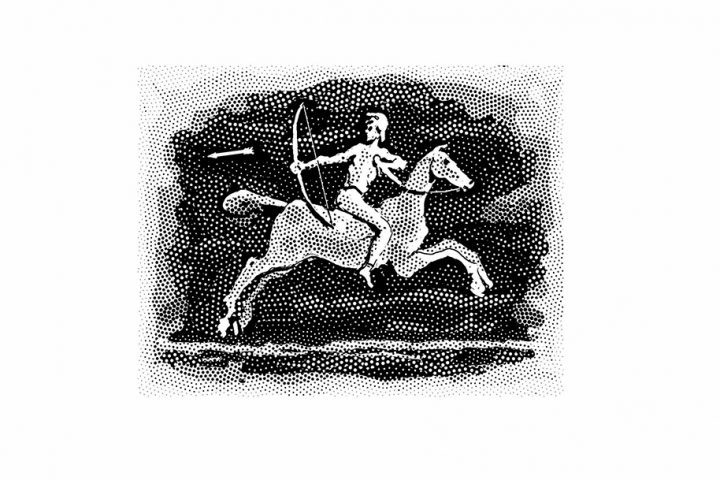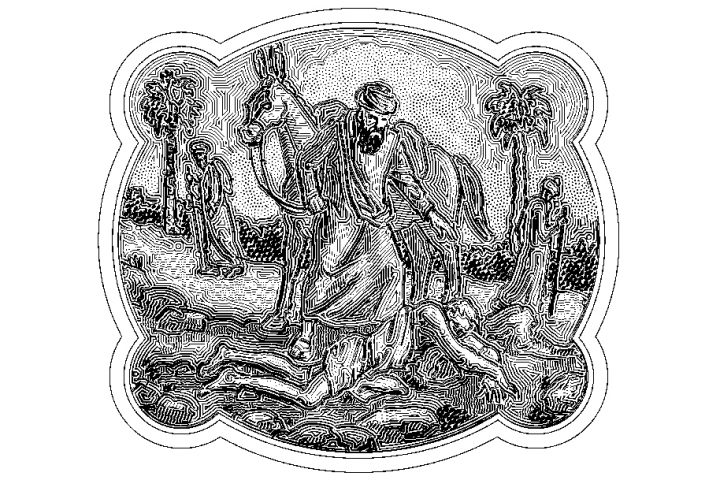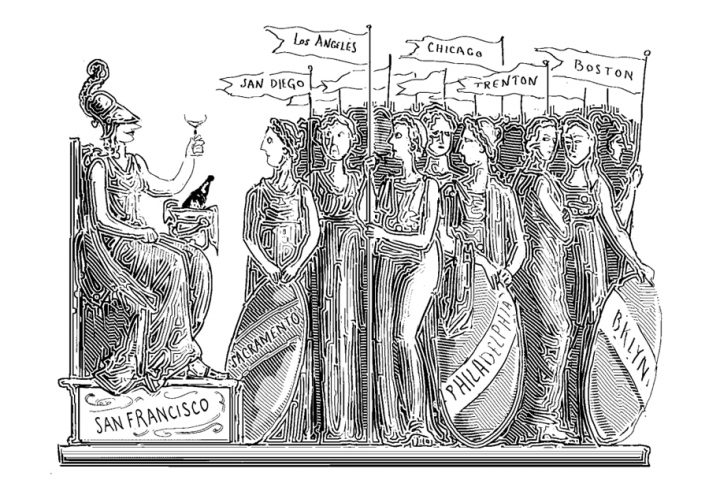Oh blessed those few who sit at the table where the bread of angels is served.”
This would be his last class, and he knew it—on Sunday afternoon, July 5, between 4:30 and 6:00 p.m. Ohio time. It was the first session in a weeklong Great American Texts course in the Masters of American History and Government program that Peter and friends had established at Ashland University. He made it all the way through with his usual panache, but that was a heroic effort. His cancer had become ferocious, and he knew such an exertion would cost him hours of agony afterward. I sat across the large seminar room from him, upstairs in the Dauch Building, with about 27 high school teachers and at least one college president. The theme of the class was the famous question asked by J. Hector St. John de Crèvecœur upon visiting America in the 1780s: “What then is the American, this new man?”
It was a perfect question for Peter. He had spent his life preparing for it.
He was born in Gyor, Hungary, the year after World War II was won and lost. Ten years later, with the Cold War in full chill, his father’s courage and ambition and his mother’s trust led them to risk their lives, and the lives of their son and daughter, to flee Communist tyranny to come to America. Peter’s father had always told him—in a saying that has by now become true legend among Peter’s acquaintances—“We were born American, but in the wrong place.” (See Peter’s own account, “Born American, but in the Wrong Place,” CRB, Fall 2006.) So, for his tenth birthday, he gave his son America.
As it happened, this immigrant boy, once he graduated from Hollywood High School and California State University, Northridge, would come to Claremont and become a student of Harry V. Jaffa, himself a student of another immigrant. But let that immigrant thought rest in the back of your mind for a moment.
Totus Porcus
In those golden days of graduate school in 1970s Claremont—before and after which, I hasten to add, he would spend even more golden days in innumerable exotic locations—Peter and a handful of friends and fellow students would regularly set aside their Plato, Lincoln, and Shakespeare, and their Greek or German studies, for an evening of poker. In later generations of graduate students, Texas Hold ’em became the game of choice. But in those days we played everything from five-card stud to Anaconda, often beginning soberly with the former and ending in high drama with the latter, gliding through some five-card draw, seven-card stud, Chicago, Acey-Deucey, and other American standards according to dealers’ moods and inspirations or popular demand.
The poker was really incidental—it provided an occasion for cigars, conviviality, and camaraderie—but it shaped the evening, gave it its pace and rhythm. On a good night, if the classicists came along, you could get the hands called in Latin. There was never any violence; always music, of the American variety, ranging from blues, to jazz, to Motown, to Country—it is a well-known fact that Charles Kesler almost singlehandedly brought Country music to Claremont—and then again, depending on the company, someone might drift into German drinking songs. But that always seemed kind of showy.
One thing did not change. In the course of the evening—every time, as if it were part of a providential order or natural law—this thing would happen. We would play a hand, and Peter, exercising the practical wisdom on which he prided himself and of which he would become a great teacher, would fold. Then the winning hand would show itself, and he would see that he had folded with better cards than had won the game. And then the beautiful thing would happen that everyone looked forward to. He would begin to curse himself, quietly at first, but savagely, eventually reverting to Hungarian because Hungarian curses have a vividness, often somehow involving farm animals, that we have not yet achieved in these still youthful centuries of the American language.
After cursing himself with increasing sincerity and at Homeric length for his lack of manliness, the great oath would come, usually with two large fists shaking the table (the regulars always picked up their drinks with impeccable timing): “I’m never folding again, never! I’m in whole hog!” He would usually use what he imagined to be the Latin, totus porcus, so that his highly educated friends would appreciate the gravity of his conviction. It seemed an announcement of both a moral principle and a principle of prudence—but above all, a principle of honor, an American variant of what we came to call the Hungarian Code of Honor.
And that is how it always was with Peter—I don’t mean in the poker games, which are just a fond part of the legend, but in life and in love and friendships and all the good things that he gave himself to, not the least of which was the cause of his chosen country. With Peter you knew he was in totus porcus, and it made everything better because he was—even fervent pessimists could not be disheartened when he was around—and it made you love to join him in these good things and hope, too, that you could go in totus porcus. You only wished you had as much porcus as that man had to give.
Peter went on to become a great teacher. You can see online the many tributes to him from generations of grateful students. In these tributes, you see that the whole hog principle was the soul of his teaching, too. His students saw in him, unmistakably, every day, the truth that there are things in life worthy of the last full measure of devotion and that a life dedicated to such things was the life you wanted to live. You wanted to be in totus porcus, and to be among friends who were in totus porcus, and it was the greatest imaginable gift to discover that.
I was reminded recently of Peter’s art and gift of teaching, which were inseparable from his gift for friendship. A young student was in his freshman class. He had admitted the student into the Ashbrook Scholar Program, which Peter directed at Ashland University, even though he seemed a bit of a risk. The student knew this. It was the first day of class. They were reading aloud—passages from Pride and Prejudice, or Churchill’s My Early Life, or Xenophon. Peter called on the boy to read and explain a passage. The boy was extremely nervous. But he did his duty, and Peter could see that the boy had something, that his guess about him had been right. His discernment of character surpassed even his judgment at poker. And he was as impetuous in the classroom as he was at the poker table. After class Peter called the student over to talk with him privately. Now the boy was terrified. He thought it was all over. He would be cashiered from the program. So Schramm leaned his big face into the boy’s face, an experience familiar to all of Peter’s friends, and he said with that totus porcus intensity that makes you want to pick the glasses up off the table: “If you don’t become a college professor, I will castrate you!” And the boy did. You can’t blame him.
I feel that mentioning the Hungarian Code of Honor as I have, without historical background, risks misleading the innocent or disappointing the curious. The Hungarian Code of Honor was conveyed to America circa 1975 in a Ford Mustang on the Hollywood Freeway by a prominent Hungarian intellectual, whose name I well recall but will protect, to an audience of three American graduate students—Schramm driving, Larry Arnn (Google him), and me. It arose from the spontaneous announcement by this widely published intellectual of the contempt he had for America and for modernity, where honor was no longer possible.
To drive the point home he told the story of the Hungarian Hussar, in the better world of the olden days, who in a fashionable Viennese salon in the company of a Hapsburg princess, probably after an excess of profiteroles, had the misfortune to…experience a petit, but audible, faux pas, the slightest zephyr, escaping from the nether regions of his trousers. Not to mince words, he broke wind. What followed would follow as a matter of course in any salon in a world in which honor was not dead. The Hussar rose, offered a formal bow to the table in general, naturally not presuming to raise his eyelids to make eye contact, walked with composure and without hurry to the balcony, drew his pistol, and removed himself discreetly but permanently from polite society.
The three American graduate students thought Mark Twain must have written that story and were ready with belly laughs and heartfelt admiration for a humor they would not have thought their esteemed companion possessed. But the Hungarian intellectual was deadly serious. When he saw our reaction, his opinion of America and of modernity was confirmed, and he assumed a countenance that said, “I pity myself that I should be subjected to the company of such buffoons.” He maintained this countenance until we dropped him at his destination in the Tujunga Hills, and he departed with the spirit and demeanor of one shaking the dust off his handmade Italian loafers.
So, when Peter would play a poker hand as if it were the last hopeless cavalry charge, his friends would nod their heads in sympathetic understanding, as if to say, “Poor fellow, he can’t help it—Hungarian Code of Honor and all,” and take his money.
American Freedom
Harry Jaffa told the story many times of how, after receiving a perfectly conventional American education as an undergraduate at Yale University, he remained completely and unconsciously in the grip of the historicism and relativism that were the conventional wisdom of his time. It took the ministrations of his immigrant teacher, Leo Strauss, to free his American mind from these shackles and drag him up from the cave of conventional nihilism to consider the possibility that the human mind is by nature free to be determined by the truth about the greatest questions. Peter learned this and many other good things from his teacher and spent the rest of his life passing the flame to his students. “You Americans!” as Peter would say. “You need an immigrant from Communist tyranny and the student of an immigrant from Nazi tyranny to teach you about freedom?”
Peter became one of the founders of the Claremont Institute for the Study of Statesmanship and Political Philosophy, its first president, a member of the board of directors for over 35 years, and first publisher of this magazine. He served in the Reagan Administration as the director of the Center for International Education in the United States Department of Education. Beginning in 1987, he served as associate director and then executive director of the Ashbrook Center at Ashland University and as a full professor at the university. On this Sunday afternoon in July, he was doing exactly what he would want to be doing, exactly what he had, with love and eternal gratitude, been doing his whole adult life—reading great texts and talking about them with students eager to learn the most important things.
The main texts we had chosen for the class were Benjamin Franklin’s Autobiography and Mark Twain’s Huckleberry Finn. The class was discussing, by way of introduction, the Declaration of Independence and the idea of equality, that American “apple of gold,” as Lincoln would later call it. One of the high school teachers suggested that the ideas in the Declaration could best be understood by remembering that they were products of their time. This was exactly the reaction Peter expected and looked forward to. It was the natural beginning of the conversation—natural because it was perfectly conventional; it issued from the generally unquestioned ideas prevailing in the world in which the class was being held. That the reaction was expected did not make it less stimulating—it was a Great Expectation. It aroused Peter the teacher, the way the Kansas-Nebraska Act aroused Lincoln the statesman.
Peter invited the student to consider some of the implications of such a thought: if we assume the ideas of the American Founders were products of their time, are we assuming that our ideas, too, are products of our time? And if so, is the idea that our thoughts are bound by our time itself merely a product of our time? Or, if it isn’t, is it not a claim to timeless truth? And if we are capable of grasping such truths, wouldn’t a kind of decent respect oblige us to grant such a capacity to “Jefferson and the boys”? It is true, he said, that this possibility is denied by the highest academic authorities in America. But why don’t we begin by daring to question this prevailing dogma of our time, to open our minds to all times. And so, with his last words as a teacher, in his last class, he did what his teacher’s immigrant teacher had done in his first class with a wayward American graduate student three quarters of a century before: he invited the student to join him in the liberating—and reasonable, and questionable, and wonderfully American—affirmation of the freedom of the human mind.



